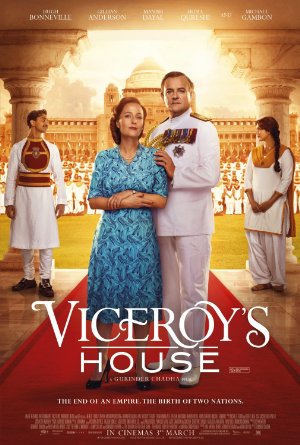Viceroy's House Review
By Rich Cline
Filmmaker Gurinder Chada (Bend It Like Beckham) draws on her own family history to explore the events surrounding the 1947 independence and partition of India. The real history is far more complex and violent than any film could adequately capture, so Chadha relies on two parallel plots that touch on varied experiences. In the end, the film is lively and enjoyable, with a strong sense of humour and some romantic surges that help the story resonate.

As Britain plans to leave India after three centuries of colonial rule, Lord Mountbatten (Hugh Bonneville) arrives in Delhi as the last viceroy, accompanied by his wife Edwina (Gillian Anderson), who takes particular interest in the process, and their daughter Pamela (Lily Travers). Unlike previous rulers, they take a real interest in the local culture, so they know how difficult it will be to avoid bloodshed between clashing Hindu, Muslim and Sikh communities. Meanwhile in their house, Hindu guard Jeet (Manish Dayal) is in love with Muslim maid Aalia (Huma Qureshi), wondering if they can to have a life together in a divided nation.
The romantic storyline is a nice counterbalance to the larger political machinations and violent cultural struggles. The way it highlights the issues is rather heavy-handed, but Dayal and Qureshi are charming enough to hold the audience's attention, and where they go isn't as obvious as it seems. Alongside them, Bonneville and Anderson sparkle with wit, stirring some comic relief into even the most intense negotiations. They also nicely play their characters as people of compassion and empathy, a nice contrast to the callous self-interested British diplomats who don't care who gets hurt in the fallout. Somewhere in between are well-meaning roles for acting icons Michael Gambon (as the chief of staff) and Simon Callow (as the man responsible for drawing the line between India and Pakistan).
By charging along at an entertaining clip, Chada kind of glosses over the fact that 14 million people were displaced in the process, and more than 1 million died in the fighting that followed. Scenes are shot on a grand scale, with some colourfully epic set-pieces and even a few terrific Bollywood flourishes, which help make up for A.R. Rahman's oddly generic score. There may be a sense that Chada has avoided the darker corners of the true story, but by concentrating on a few people and their personal journeys, she makes sure the audience travels with them. And she makes us want to learn more about what really happened.

Facts and Figures
Year: 2017
Genre: Dramas
Run time: 106 mins
Production compaines: BBC Films, Bend It Films, Pathé
Reviews
Contactmusic.com: 3.5 / 5
IMDB: 6.9 / 10
Cast & Crew
Director: Gurinder Chadha
Producer: Paul Mayeda Berges, Gurinder Chadha, Deepak Nayar
Screenwriter: Paul Mayeda Berges, Gurinder Chadha, Moira Buffini
Starring: Hugh Bonneville as Lord Mountbatten, Gillian Anderson as Edwina Mountbatten, Michael Gambon as General Hastings Ismay, Manish Dayal as Jeet, Simon Callow as Cyril Radcliffe, Om Puri as Ali Rahim Noor, Lily Travers as Lady Pamela Hicks, Huma Qureshi as Aalia, Simon Williams as Archie Wavell, Arunoday Singh as Asif, Sarah-Jane Dias as Sameera, Lucy Fleming as Lady Wavell, Marcus Jean Pirae as Alan Campbell Johnson, Samrat Chakrabarti as Mohsin, Terence Harvey as Sir Fred Burrows, Roberta Taylor as Miss Reading, Neeraj Kabi as Mahatma Gandhi, Denzil Smith as Muhammad Ali Jinnah, Darshan Jariwala as Guptaji, Rajendranath Zutshi as Duleep, Jaz Deol as Governor Jenkins, Robin Soans as Jawaharlal Nehru, Tanveer Ghani as Farrukh, Trishaan as Sanjit, Hriiday Malhotra as Henry Grady
Also starring: Paul Mayeda Berges, Gurinder Chadha, Deepak Nayar














